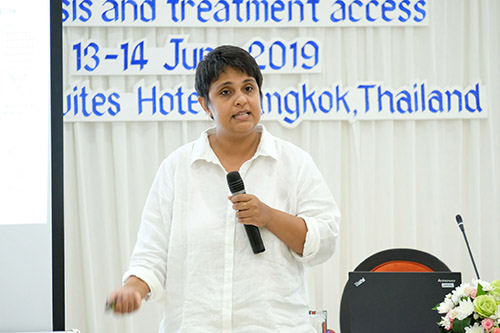A Forgotten Epidemic: Expanding Treatment Access for Hepatitis C
amfAR’s TREAT Asia program contributes to success of multi-year collaboration on treatment access
More than 58 million people worldwide are living with chronic hepatitis C virus (HCV) infection, according to the World Health Organization. In 2019, an estimated 290,000 people died from diseases such as cirrhosis or liver cancer as a consequence of HCV. Since HCV, like HIV, is a blood-borne virus, modes of transmission for the two viruses are similar. And since people with HCV may show no symptoms, many do not know they are infected.

Despite the existence of direct-acting antivirals (DAAs) that can cure more than 95% of people with HCV, these drugs remain difficult to access for those who need them. As an advocate of expanded access to treatment, in 2017 TREAT Asia joined a collaborative project aimed at stimulating demand for HCV care by raising awareness among civil society organizations and national decision makers.
The HIV/HCV Drug Affordability project was initiated by the global health organization Unitaid in May 2014, and involved collaborating partners in seven countries: Brazil, Colombia, Morocco, India, Indonesia, Thailand and Malaysia. The lead partner was Coalition PLUS, an international association of organizations fighting HIV and hepatitis, and the project ran until May 2021.
“This was a grassroots collaborative effort to expand access to hepatitis C treatment in Asia and we’re proud to have been a part of it,” said Dr. Annette Sohn, director of TREAT Asia. “Our many years of experience as a coalition builder and a leading advocate of expanded access to treatment for HIV and HCV in the region enabled us to generate substantial progress in this important but often neglected arena.”

TREAT Asia acted as technical support provider for consortium partners in Asia. Among its contributions to the project, TREAT Asia:
• Worked closely with national partners to secure registration of and access to DAAs. At the outset of TREAT Asia’s involvement, none of the project’s partner countries were using DAAs in their national programs. By the end of the project, thanks in part to TREAT Asia’s involvement, all four of the target countries—India, Indonesia, Malaysia and Thailand—were doing so.
• Helped establish a global reference on pricing and the regulatory status of DAAs. The reference has been used by the World Health Organization (WHO), pharmaceutical companies, researchers and physicians.
• Developed the first collaboration between WHO SEARO (South East Asia) and WHO WPRO (Western Pacific) to address HCV, which focused on decentralizing diagnosis and treatment knowledge. TREAT Asia trained more than 100 physicians from several countries across the region on the management of HCV and worked with partners to create a set of training modules on HCV diagnosis and management. WHO further modified the modules into content that is publicly available on its website.
• Developed “snapshots” highlighting key aspects of DAA use and availability in lay language to expand access to knowledge of individual medications and potential drug-drug interactions with HIV meds
• Developed simplified factsheets on the WHO HCV guidelines, which were widely shared by community groups, physicians, policymakers and international agencies, and were made available in multiple Asian languages.
The project highlighted community participation and its essential role in the elimination of HCV. As noted by Giten Khwairakpam, TREAT Asia’s program manager for community and policy, “we also assisted our national community partners in securing their place at international events as speakers or participants, and publishing their work in scientific journals and on social media. This has raised awareness around the vital importance of civil society’s ongoing involvement in responding to viral hepatitis.”
Share This:
